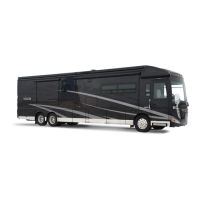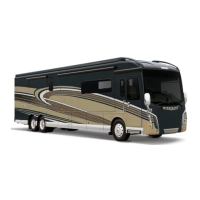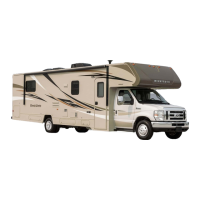Do you have a question about the Winnebago 2011 sunova and is the answer not in the manual?
Details on the purpose and scope of the operator's manual.
Explanation of safety alert symbols (Danger, Warning, Caution, Note) used in the manual.
Information on the dealer's responsibility for pre-delivery inspection of the motor home.
Recommendation for checking and adjusting front suspension and steering alignment.
Guidance on obtaining dealer assistance and warranty repairs while traveling.
Procedure for informing NHTSA and Winnebago about potential safety defects.
Details about the label specifying vehicle occupant and cargo carrying capacity.
Explanation of the data found on the vehicle certification label.
Table of key specifications and fluid capacities for various motor home models.
Section for recording owner, vehicle, dealer, and service center details.
Overview of the basic limited warranty, structural warranty, and owner responsibilities.
Essential safety guidelines for operating the motor home, including seat belts and secure seating.
Precautions and advice for safe driving, including conditions to avoid and vehicle handling.
Safety warnings regarding refueling motor fuel and propane containers.
Procedure to follow if propane gas leaks are detected, emphasizing immediate safety actions.
Information on the coach's propane gas leak detector and its function.
Precautions against inhaling exhaust gases which contain carbon monoxide.
Details about the coach's carbon monoxide alarm and its detection capabilities.
Information on the smoke alarm, its detection capabilities, and replacement advice.
Location, inspection, and replacement guidelines for the fire extinguisher.
General safety warnings regarding handling electrical components and grounding.
Guidelines for securely storing items and being aware of weight limits during travel.
Important maintenance precautions, such as checking coolant and avoiding jacking safety issues.
Description and operation of the bedroom escape window for emergency egress.
Safety warnings and precautions related to operating slideout rooms.
Information on formaldehyde emissions from interior materials and potential health effects.
Guidance on preventing mold growth and addressing moisture issues within the coach.
Safety warnings and precautions for using the roof and ladder access.
Procedures and advice for handling roadside emergencies, including flat tires.
Instructions and precautions for jump-starting the engine using the battery boost or another vehicle.
Steps to take if the engine is suspected of overheating.
Information on adjusting and swiveling the driver and co-pilot seats for comfort and access.
Proper use, adjustment, and care of lap and lap/shoulder belts for passenger safety.
Guidelines for selecting, installing, and using child restraint systems.
Details on the KeyOne lock system, including key replacement.
Operation and features of the rearview camera monitor system for maneuvering.
Operation of the 12V front drop-down shade for privacy and sun control.
Instructions for adjusting power electric mirrors and mirror heaters.
Explanation of the safety feature preventing shift lever movement without brake application.
Instructions for applying and disengaging the foot-operated park brake.
How to use the Tow/Haul mode for improved performance when towing or driving heavily loaded.
Operation of the dash-mounted climate control system for the cab area.
Guidance on checking and maintaining the engine cooling system, including coolant type.
Function and operation of the switch that disconnects chassis electrical loads.
Importance of proper tire pressure for safety, handling, and wear.
Information on factory alignment and the need for periodic checks and adjustments.
Location and reset procedure for automotive 12-volt circuit breakers and fuses.
Operation modes (AC/Propane), leveling requirements, and basic operation of the refrigerator.
Operation of the propane gas range and oven, including lighting and pilot control.
Operating instructions for the microwave oven and microwave oven/range hood.
Overview of the monitor panel for checking utility system conditions like tank levels.
Operation of the dual-power water heater, including propane and electric modes.
Instructions for starting up and shutting down the propane gas furnace.
Information on the heat pump's operation, efficiency, and interaction with the furnace.
Control of the ducted roof air conditioner via the furnace thermostat.
Overview of the propane gas system, its function, and safe handling.
Precautions for safe operation, including tank filling and appliance control.
Legal travel restrictions and warnings related to propane gas transportation and leaks.
Information on the pressure regulator's function, protection, and maintenance.
Critical safety warnings regarding electrical system handling and potential hazards.
How the 120-volt AC system operates from shoreline or generator power.
Instructions for connecting the external power cord (shoreline) to utility services.
Information on the 1000W inverter unit for converting DC to AC power.
Overview of the power center, including converter, circuit breakers, and electrical system.
Function of 120-volt AC circuit breakers and procedure for resetting them.
Explanation of GFCI outlets for protection against electrical shock.
Operation and safety for the electrical generator and automatic power transfer switch.
Description of the 12-volt DC system components: chassis battery, house batteries, converter.
Function of the disconnect switch for conserving battery power during storage.
Recommendations for battery maintenance to prevent sulfating and ensure proper charge.
Protection of 12-volt circuits by fuses or breakers and replacement procedures.
Overview of the fresh water system, supply sources, and filling procedures.
Operation of the demand water pump, including self-priming and strainer maintenance.
Procedure for disinfecting the potable water system using chlorine bleach.
Functionality and use of the exterior shower/wash station.
Care and maintenance of the RV toilet, including 'don'ts' for waste disposal.
Description of the self-contained waste water system with black and gray water tanks.
Step-by-step instructions for draining holding tanks at a disposal site.
Identification and operation of waterline and tank drain valves for maintenance.
Function of the bypass valve for winterization and normal water flow.
Two methods for winterizing the water system: blow-out or antifreeze fill.
Procedure for draining the water heater tank to prevent damage during winterization.
Final steps for draining and cleaning holding tanks after winterization procedures.
General operation of the audio-video system, including TV sound and video input.
Instructions for playing DVDs, adjusting settings, and connecting components.
Operation of the CD/DVD player and stereo radio, including exterior entertainment center.
Raising, rotating, and lowering the TV antenna for optimal signal reception.
Operation of the TV signal amplifier switch for boosting reception.
Location of connectors for satellite dish and cable TV hookups.
Information on pre-wiring for a digital satellite TV system.
Instructions for setting up and operating the digital satellite television system.
Operation and securing of the swivel glider lounge chair for travel.
Storage and securing procedures for buffet table and chairs.
Instructions for converting the dinette table mechanism into a bed.
Steps for converting the sofa into a bed and back into a sofa.
Operation of the Comfort Sofa Sleeper with an adjustable air bed.
How to extend and retract the sectional sofa for additional seating.
Operation of manual roller shades for solar heat protection and light blocking.
Operation of electric slideout room travel locks for securing the room during transit.
Instructions for extending and retracting slideout rooms using electric controls.
Troubleshooting common electric slideout room issues related to voltage or circuit breakers.
Steps to diagnose and resolve issues when retracting slideout rooms.
Procedure for manually retracting front slideout rooms in case of electrical failure.
Procedure for manually retracting the bedroom slideout room via motor/gear assembly.
Introduction to the hydraulic leveling system for easier parking and site selection.
Instructions for checking the hydraulic oil level in the leveling system.
Importance of inspecting and maintaining sealants to prevent water intrusion.
Safety precautions and maintenance recommendations for the motor home roof.
Precautions for maintaining the exterior paint finish, including parking and washing advice.
Cleaning instructions for wooden and vinyl simulated wood cabinetry.
Care and cleaning of work surfaces, including recommendations for furniture wax.
Care and maintenance tips for keeping stainless steel appliances clean and shining.
Cleaning instructions for the acrylic galley sink, including stain removal.
Maintenance recommendations for the range and refrigerator appliances.
Care and maintenance guidelines for vinyl flooring.
Steps to properly prepare the vehicle for storage to prevent damage.
Detailed checklist for cleaning and preparing the coach for extended storage.
Guidance to consult the chassis manual for specific service and maintenance information.
Recommended maintenance schedule for various coach systems and components.
Guidelines for proper vehicle loading, weight distribution, and capacity awareness.
How to weigh the fully loaded coach at a commercial scale for weight distribution.
Method for weighing each corner of the coach to ensure proper side-to-side weight distribution.
Information on hitch ratings, tongue weight, and safe towing practices for vehicles.
Understanding Gross Vehicle Weight Rating (GVWR) and Gross Axle Weight Rating (GAWR).
Operation instructions for the coach's fireplace, including controls and temperature adjustment.
Operation of the electric entry step, including automatic and stationary modes.
Operating instructions for crank-out and horizontal slider windows.
Operation of the power roof ventilator, including dome crank and fan speed controls.
Operation of the power patio awning and door awning, including ignition lockout.
Tips for ensuring proper latching of exterior storage compartment doors.
Function of the switch that powers interior compartment lights.
Information on storage locations for the roof ladder extension and tools.
Safety warnings and precautions for using the roof ladder.
| Manufacturer | Winnebago |
|---|---|
| Model | Sunova |
| Model Year | 2011 |
| Category | Motorhomes |
| Class | A |
| Fuel Type | Gasoline |
| Horsepower | 362 hp |
| Torque | 457 lb-ft |
| Transmission | 5-speed automatic |
| Engine | Ford Triton V10 |
| Chassis | Ford |
| Slide-outs | 2 |
| Fuel Capacity | 80 gal |
| LP Gas Capacity | 18 gal |












